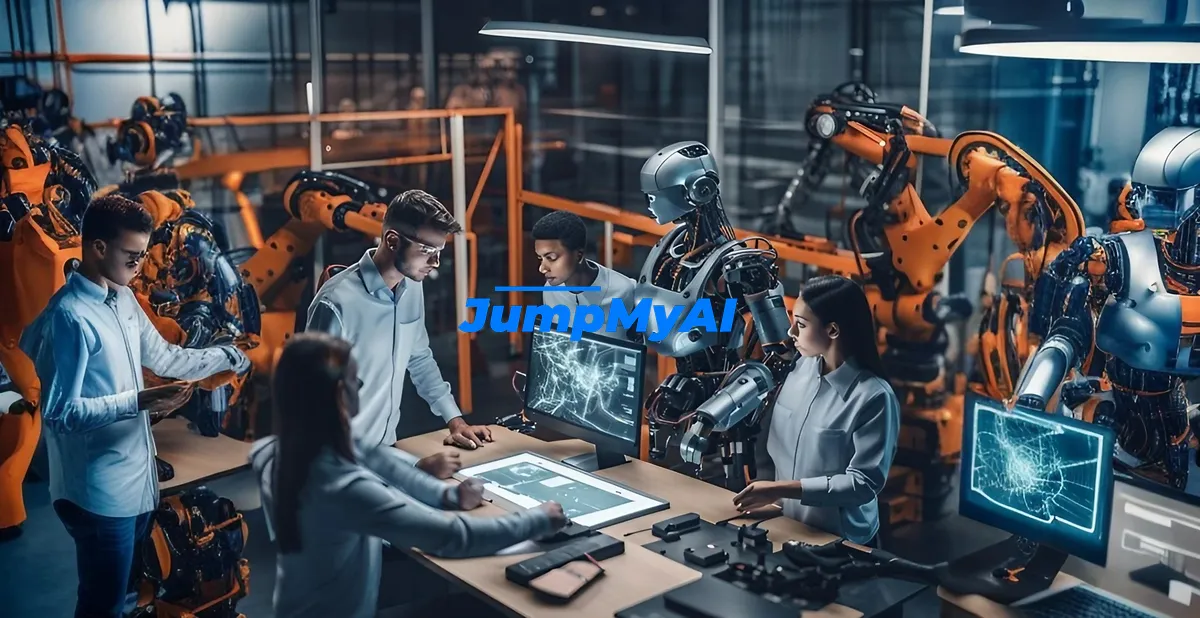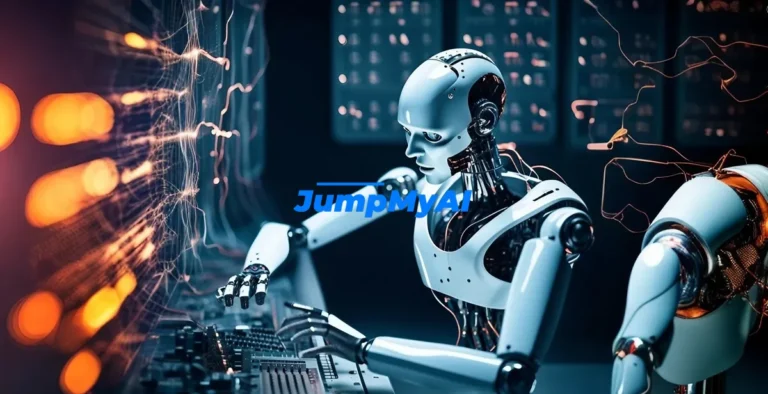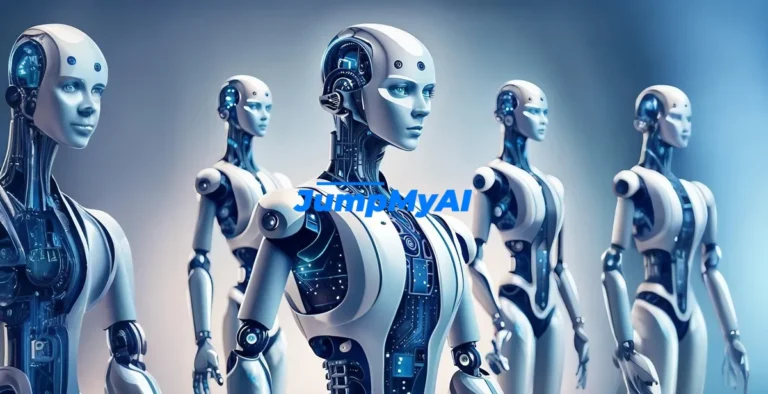What is an AI Automation Agency? – Futureproof Your Business Before It’s Too Late
1. Brief Explanation of the Concept of AI Automation Agency
In today’s rapidly evolving business landscape, the integration of artificial intelligence (AI) and automation has become a game-changer for organizations across various industries. AI refers to the development of intelligent machines capable of performing tasks that typically require human intelligence. On the other hand, automation involves the use of technology to streamline and automate processes, reducing the need for manual intervention. When these two forces merge, we witness the birth of a new phenomenon: AI Automation.
At the forefront of this transformative technological wave are AI Automation Agencies. These agencies specialize in leveraging AI and automation to optimize operations, enhance efficiency, and unlock untapped potential within organizations. They understand the power of combining cutting-edge technologies with strategic thinking to revolutionize processes and drive success.
Thinking of starting an ai automation agency? But don’t know how? Read this: How To Start an AI Automation Agency – Ultimate 10-Page Guide
2. Understanding the Concepts: AI, Automation, and AI Automation
Artificial Intelligence (AI) and automation are two transformative concepts that have revolutionized the way businesses operate. While these terms are often used interchangeably, they have distinct differences. Let’s delve into the definitions and explore the intersection of AI and automation, giving rise to the concept of AI Automation.
2.1 Definition and Explanation of Artificial Intelligence (AI)
Artificial Intelligence, or AI, is a branch of computer science that focuses on creating computer systems capable of performing tasks that would typically require human intelligence. AI systems can analyze data, recognize patterns, and make decisions based on predefined rules. These systems leverage technologies such as natural language processing, computer vision, and machine learning to imitate human intelligence.
2.2 Definition and Explanation of Automation
Automation, on the other hand, involves the use of technology to streamline and simplify repetitive tasks and processes without human intervention. It replaces manual labor and minimizes the scope for human error. Automation can be found in various industries, ranging from manufacturing to customer service, where machines and systems take over routine activities.
2.3 Intersection of AI and Automation: AI Automation
The intersection of AI and automation gives rise to a powerful concept known as AI Automation. It combines the benefits of both AI and automation, enabling businesses to offload repetitive tasks to machines while leveraging AI’s insights and decision-making capabilities. AI Automation empowers organizations to achieve faster execution, personalized experiences, improved data accuracy, and the ability to focus on higher-value contributions.
2.4 Understanding AI Automation Agencies
AI Automation Agencies are specialized service providers that assist businesses in integrating AI and automation into their operations. These agencies have expertise in developing and deploying AI systems and automation solutions to enhance efficiency, productivity, and overall performance. With a deep understanding of AI technologies and automation processes, these agencies collaborate with businesses to identify opportunities for optimization and implement tailored strategies.
By partnering with AI Automation Agencies, businesses can leverage their knowledge and experience to unlock the full potential of AI and automation in their operations. These agencies offer a wide range of services to cater to different industry needs, ranging from process automation to data analysis and predictive modeling.
“AI Automation Agencies assist businesses in harnessing the power of AI and automation to optimize operations and drive success.”
3. Role of AI Automation Agencies in Intelligent Automation
3.1. Defining Intelligent Automation
Intelligent automation, also known as cognitive automation, is a transformative solution that combines artificial intelligence (AI), business process management (BPM), and robotic process automation (RPA) to streamline decision-making across organizations. By simplifying processes and enhancing operational efficiencies, intelligent automation finds applications in various industries.
3.2. Elements of Intelligent Automation: AI, BPM, RPA
Intelligent automation encompasses three key components that work in synergy to drive operational excellence and customer satisfaction. Let’s take a closer look at these elements:
- AI: This component of intelligent automation analyzes data, makes predictions, and imitates human intelligence. Utilizing technologies like natural language processing (NLP), computer vision, and machine learning, AI helps organizations gain insights, automate repetitive tasks, and create personalized experiences. The integration of AI into automation systems enables businesses to offload mundane and repetitive tasks to machines, allowing human experts to focus on higher-value contributions.
- BPM: Business process management (BPM) is another crucial element of intelligent automation. By automating workflows, BPM ensures greater consistency, reduced errors, and increased operational efficiency. It allows organizations to standardize and optimize their processes while providing a comprehensive view of their operations. Through the use of BPM software, AI automation agencies help businesses align their processes with their strategic goals.
- RPA: Robotic process automation (RPA) utilizes software bots to handle tasks, allowing organizations to automate routine, rule-based processes and increase productivity. RPA offers the advantage of executing tasks across multiple applications and systems without the need for human intervention. AI automation agencies leverage RPA to streamline workflows, reduce manual effort, and vastly improve efficiency.
3.3. Role of AI Automation Agencies in integrating these elements
AI automation agencies play a pivotal role in integrating the elements of intelligent automation into businesses’ existing frameworks. By leveraging their expertise and deep understanding of AI and automation, these agencies help organizations harness the full potential of intelligent automation. Here’s how AI automation agencies contribute to the integration process:
- Consultation and Assessment: AI automation agencies work closely with organizations to assess their existing processes and identify areas where intelligent automation can be implemented. Through consultations, agencies gain insights into businesses’ needs and goals, enabling them to customize intelligent automation solutions that address specific challenges and maximize efficiency.
- Custom Solution Development: AI automation agencies develop customized AI automation solutions tailored to businesses’ unique requirements. They leverage advanced AI technologies and integrate them with existing systems, ensuring seamless workflow integration and minimal disruption to daily operations. These agencies specialize in architecting intelligent automation systems that align with businesses’ goals and drive operational excellence.
- Implementation and Training: Once the solutions are developed, AI automation agencies facilitate the smooth implementation and integration of these systems into organizations’ existing infrastructure. They provide guidance, training, and support to employees, ensuring a smooth transition and minimal disruption during the integration process. By empowering employees with the necessary skills and knowledge, agencies enable businesses to fully leverage the benefits of intelligent automation.
- Ongoing Support and Optimization: AI automation agencies provide ongoing support and maintenance to ensure the smooth functioning of the integrated systems. They continuously monitor performance, identify areas for optimization, and implement necessary updates and improvements. By offering dedicated support, these agencies help businesses maximize the potential of intelligent automation, ensuring long-term success and growth.
AI automation agencies play a crucial role in integrating the key elements of intelligent automation into organizations. Through their expertise and customized solutions, these agencies empower businesses to streamline processes, enhance operational efficiency, and capitalize on the transformative capabilities of AI and automation.
4. Operations and Services of AI Automation Agencies
Artificial Intelligence (AI) has been rapidly transforming the way businesses operate, and AI Automation Agencies play a pivotal role in harnessing the power of AI to enhance operational efficiency and drive success in today’s competitive landscape. These agencies offer a wide range of services that leverage AI and automation technologies to streamline processes and optimize outcomes. Here, we explore the operations and services provided by AI Automation Agencies, highlighting their capabilities in delivering significant value to businesses.
You can refer to our in-depth article on services offered by an ai automation agency here: 11+ AI Automation Agency Services in 2023 To Offer
4.1. Overview of AI Automation Agency Services
AI Automation Agencies are at the forefront of integrating AI and automation technologies into organizations, revolutionizing the way they operate and achieve their goals. These agencies provide valuable services that cater to the evolving needs of businesses, delivering tailored solutions to enhance productivity, efficiency, and customer experiences. Some of the key services offered by AI Automation Agencies include:
- Process Automation: AI Automation Agencies excel in automating various workflows and processes within organizations, enabling businesses to reduce manual effort and increase operational efficiency. Through the deployment of Robotic Process Automation (RPA) and intelligent algorithms, these agencies ensure the seamless execution of repetitive tasks, freeing up human resources to focus on higher-value activities.
- Data Analytics and Insights: Leveraging AI technologies, AI Automation Agencies gather and analyze vast amounts of data to derive valuable insights that drive informed decision-making. They utilize advanced analytics tools, such as machine learning algorithms, natural language processing, and predictive modeling, to uncover patterns, trends, and customer preferences. By harnessing these insights, businesses can optimize their strategies and enhance their competitive advantage.
- Personalization and Customer Experience: AI Automation Agencies specialize in leveraging AI technology to deliver personalized experiences to customers. By utilizing machine learning algorithms, natural language processing, and computer vision, these agencies can analyze customer data and preferences, enabling businesses to offer tailored and relevant recommendations, products, and services. This level of personalization enhances customer satisfaction and improves overall customer experiences.
- Chatbots and Virtual Assistants: AI Automation Agencies excel in developing and implementing intelligent chatbots and virtual assistants that handle customer queries, provide support, and offer personalized recommendations. These AI-powered conversational interfaces utilize natural language processing and machine learning algorithms to understand and respond to customer inquiries promptly and accurately. By implementing chatbots, businesses can provide round-the-clock assistance, enhance customer engagement, and improve operational efficiency.
4.2. How AI Automation Agencies Utilize AI
AI Automation Agencies harness the power of AI in various ways to optimize the operational efficiency of businesses. By leveraging AI technologies, these agencies streamline processes, reduce costs, and enhance outcomes. Here are some examples of how AI Automation Agencies utilize AI:
- Predictive Analytics: AI Automation Agencies deploy AI-powered predictive analytics models to forecast future trends and make informed decisions. By analyzing historical data and identifying patterns, these agencies help businesses anticipate customer behaviors, optimize inventory management, and enhance marketing strategies.
- Natural Language Processing: AI Automation Agencies leverage natural language processing (NLP) to interpret and understand unstructured data, such as customer reviews, social media posts, and emails. By extracting valuable insights from this data, businesses can gain a deeper understanding of customer sentiments, identify emerging trends, and tailor their offerings accordingly.
- Image and Voice Recognition: AI Automation Agencies harness image and voice recognition technologies to automate various tasks. For example, image recognition can be used to automatically classify and tag images, enabling businesses to organize their digital assets efficiently. Voice recognition technologies can be applied to develop voice-activated assistants and improve customer service through voice-based interactions.
4.3. Specific Cases of Operational Optimization
One notable example of an AI Automation Agency that excels in operational optimization is Hallam, a highly recommended agency in the UK. Hallam utilizes AI automation services to help businesses achieve better results by leveraging the power of AI. Their comprehensive range of services includes:
- AI-Driven Data Segmentation: Hallam utilizes AI to segment client data, enabling businesses to target their audience more effectively. By analyzing various data points, such as demographics, preferences, and past behavior, they enable businesses to deliver personalized content and experiences, improving customer satisfaction and conversion rates.
- Automation of Repetitive Tasks: Hallam automates repetitive tasks, such as content creation and data analysis, through the use of AI and automation tools. This automation helps businesses save time and resources, allowing them to focus on strategy and creativity rather than mundane tasks.
- Optimizing Digital Advertising: With AI automation, Hallam optimizes digital advertising campaigns by analyzing vast amounts of data and adjusting campaigns in real-time. This ensures that businesses achieve the best possible results from their advertising efforts and maximize their return on investment.
By constantly integrating new technologies and staying ahead of the curve, AI Automation Agencies like Hallam position themselves as strategic partners capable of executing effective strategies to outperform their competitors.
AI Automation Agencies play a crucial role in operational optimization for businesses by leveraging the power of AI and automation technologies. Their services encompass a wide range of capabilities, including process automation, data analytics, personalization, and the implementation of chatbots and virtual assistants. By harnessing the potential of AI, these agencies enhance operational efficiency, improve customer experiences, and provide businesses with a competitive edge in a rapidly evolving market.
5. Benefits of Engaging AI Automation Agencies
Implementing AI automation within an organization can bring numerous advantages, and engaging the expertise of AI automation agencies can amplify these benefits. The following are some of the key advantages businesses can gain by partnering with AI automation agencies:
5.1. Operational and cost efficiencies
- AI automation agencies can help streamline and optimize various operational processes, resulting in increased efficiency and reduced costs.
- By leveraging AI technologies and automated workflows, these agencies can eliminate manual tasks, minimize errors, and accelerate the pace of operations.
- Through intelligent data analysis and predictive capabilities, AI automation agencies can uncover insights that help organizations make informed decisions and optimize resource allocation.
“Partnering with an AI automation agency can propel businesses towards unprecedented operational efficiency and cost savings. By harnessing the power of AI and automation, organizations can gain a competitive edge by streamlining processes, maximizing productivity, and minimizing resource wastage.”
5.2. Enhanced competitive advantage
- AI automation agencies equip businesses with the tools and strategies to stay ahead in today’s highly competitive market.
- By automating certain tasks and leveraging AI-powered algorithms, organizations can deliver personalized experiences to their customers at scale, fostering customer loyalty and satisfaction.
- AI automation agencies can help businesses gain valuable insights from data, enabling them to make data-driven decisions, identify trends, and develop effective marketing and sales strategies.
- With faster and more efficient operations, businesses can respond quickly to market demands and changing customer preferences, giving them a significant competitive edge.
“Engaging an AI automation agency isn’t just about staying relevant; it’s about gaining a competitive advantage. These agencies empower businesses with AI-driven insights and automation capabilities, enabling them to deliver personalized experiences, make data-driven decisions, and outperform their competitors.”
5.3. Focus on creativity and strategy
- By offloading repetitive and mundane tasks to AI systems and automation, businesses can free up their human workforce to focus on more creative and strategic endeavors.
- AI automation agencies can assist in automating time-consuming activities such as data entry, report generation, and content creation, allowing professionals to channel their energy into more value-added activities.
- With AI-powered tools, organizations can tap into AI’s processing power and cognitive abilities to gain deeper insights, develop innovative solutions, and drive business growth.
- The expertise offered by AI automation agencies can help businesses identify areas where AI and automation can have the most impact, enabling them to allocate resources effectively and drive innovation.
“Shifting the burden of repetitive tasks to AI and automation means businesses can unleash the full potential of their human workforce. By partnering with AI automation agencies, companies can tap into the creative and strategic capabilities of their employees, fostering a culture of innovation and driving sustainable growth.”
Engaging AI automation agencies brings substantial benefits to businesses. The services provided by these agencies help optimize operations, enhance competitive advantage, and allow organizations to focus on creativity and strategy. By unlocking the power of AI and automation, businesses can achieve operational efficiency, gain a competitive edge, and leverage the full potential of their human workforce. As AI automation continues to evolve, partnering with the right agency becomes increasingly critical in navigating the rapidly changing business landscape.
6. Industries Impacted by AI Automation
As AI automation continues to revolutionize industries worldwide, its impact can be felt across various sectors. The integration of artificial intelligence and automation has the potential to transform work activities and drive significant advancements. Let’s explore some key insights into the industries that are being influenced by the rise of AI automation.
6.1. Broad impact across various sectors
AI automation has the remarkable ability to transcend industry boundaries and impact diverse sectors. Here are some industries that are experiencing the transformative power of AI automation:
- Customer Operations: With AI-powered chatbots and virtual assistants, customer interactions are becoming more personalized and efficient. These intelligent systems can handle inquiries, resolve issues, and provide tailored recommendations, thereby enhancing the overall customer experience.
- Marketing and Sales: AI automation is empowering marketers to make data-driven decisions, optimize campaigns, and personalize customer journeys. With sophisticated algorithms and machine learning models, businesses can tap into valuable insights and target audiences with precision.
- Software Engineering and Development: AI automation offers developers tools and frameworks to streamline the software development lifecycle. From automating testing procedures to optimizing code quality, AI-powered systems can significantly improve efficiency and accelerate delivery timelines.
6.2. Industries Quick to Adopt AI Automation
While AI automation has the potential to reshape numerous industries, some sectors have been quick to embrace its transformative capabilities. Here are a few examples:
- Human Resources: AI automation has brought immense efficiency to HR processes, such as resume screening, candidate matching, and employee onboarding. By automating repetitive tasks, HR professionals can focus more on strategic initiatives, talent development, and fostering a positive work environment.
- Finance and Banking: AI automation has revolutionized the financial sector by enabling tasks like fraud detection, risk assessment, and personalized financial advice. With AI-powered algorithms analyzing vast amounts of data, financial institutions can make faster and more accurate decisions while improving customer satisfaction.
6.3. Industries with slower adoption rates
While some industries have readily embraced AI automation, others have been more cautious in their approach. Let’s take a look at an example:
- Education: The implementation of AI automation in the education sector has been relatively slower. While virtual classrooms and online learning platforms have gained prominence, the full integration of AI automation in educational practices is still evolving. However, as technology continues to advance and educational institutions recognize the benefits, we can anticipate increased adoption in the future.
The impact of AI automation extends across industries, with some sectors quick to adopt and others moving at a slower pace. The transformative power of AI automation is reshaping customer operations, marketing and sales, software engineering, HR, finance, and more. As technology continues to evolve, it will be crucial for businesses to adapt and embrace AI automation to stay ahead in a rapidly changing landscape. By leveraging the power of AI automation, industries can unlock new opportunities for growth, enhance operational efficiency, and drive innovation.
7. Challenges in AI Automation Adoption
As with any transformative technology, the adoption of AI automation comes with its own set of challenges. Organizations and individuals may encounter resistance, face a lack of understanding, or experience slow adoption rates. It is crucial to address these challenges to ensure a smooth and successful integration of AI automation. Here are some key challenges and strategies for overcoming them:
7.1. General Resistance to AI and Automation
- Perceived job loss: One of the main concerns surrounding AI automation is the fear of job displacement. Many individuals worry that the integration of AI technologies will render their job roles obsolete. It is important to address these concerns by emphasizing the role of AI as a tool for augmentation rather than substitution. AI automation can help employees focus on more meaningful tasks and enhance their productivity.
- Cultural acceptance: Organizations may face resistance to change from employees who are unfamiliar or uncomfortable with new technologies. Some individuals may resist AI automation out of fear or skepticism. To overcome this challenge, organizations should focus on creating a culture of innovation and continuous learning. Providing comprehensive training programs and demonstrating the benefits of AI automation can help alleviate concerns and promote acceptance.
7.2. Specific Challenges: User Resistance, Lack of Understanding, Slow Adoption Rates
- User resistance: Users may resist the adoption of AI automation due to a lack of familiarity or perceived complexity. It is crucial to involve users in the decision-making process and provide clear explanations of how AI automation will benefit them. Demonstrating the ease of use and showcasing success stories can help alleviate resistance and encourage user buy-in.
- Lack of understanding: Lack of understanding regarding AI automation can hinder its adoption. Organizations should invest in comprehensive training programs to ensure employees have the necessary knowledge and skills to leverage AI technologies effectively. Promoting a culture of continuous learning can help bridge the knowledge gap and foster a positive attitude towards AI automation.
- Slow adoption rates: The adoption of AI automation can be a gradual process for many organizations. Some may face challenges in implementing AI technologies due to budget constraints, technical limitations, or cultural barriers. To overcome these challenges, organizations should start small and focus on pilot projects to demonstrate the benefits of AI automation. Building internal expertise through partnerships with AI automation agencies can also accelerate adoption.
“The biggest challenge to AI adoption in the enterprise is not the technology, but rather the cultural and organizational barriers.”
7.3. Solutions and Strategies to Overcome These Challenges
- Education and awareness: Organizations should invest in educational initiatives to promote awareness and understanding of AI automation. Conducting workshops, webinars, and training programs can help employees understand the potential of AI automation and its impact on their work. Sharing success stories of organizations that have successfully implemented AI automation can also inspire others to embrace the technology.
- Change management: Implementing AI automation requires a well-structured change management approach. Organizations should communicate clearly about the objectives, benefits, and potential challenges of AI automation. Involving key stakeholders and employees in decision-making processes and providing training and support can help manage resistance and ensure a smooth transition.
- Partnerships with AI automation agencies: Collaborating with AI automation agencies can provide organizations with the expertise and resources needed for successful implementation. These agencies specialize in integrating AI technologies and have extensive knowledge of industry best practices. By leveraging their expertise, organizations can navigate the complexities of AI automation adoption and ensure optimal results.
“AI and automation will augment human jobs and make them more efficient, allowing employees more time to focus on value-added tasks.”
Embracing AI automation requires organizations to overcome challenges, change mindsets, and foster a culture of innovation. By addressing resistance, promoting understanding, and adopting effective strategies, organizations can unlock the full potential of AI automation. With careful planning and collaboration, businesses can reap the benefits of enhanced operational efficiency, improved customer experiences, and a competitive edge in the rapidly evolving digital landscape.
8. Workforce Implications and The Future of Jobs
With the rapid advancement of AI automation, the workforce landscape is undergoing significant transformations. Organizations are increasingly leveraging AI-powered technologies to automate repetitive tasks and enhance operational efficiency. However, these advancements raise important questions about the future of jobs and the implications for the workforce.
8.1 Impact of AI Automation on Job Roles
As AI and automation technologies continue to evolve, certain job roles are at risk of being substituted by automated systems. Routine and repetitive tasks that do not require human creativity or critical thinking can be easily automated, leading to potentially reduced demand for roles centered around these tasks.
However, it is crucial to note that the impact of AI automation varies across different industries and job functions. While some roles may become obsolete, new opportunities and roles will emerge. Jobs that involve complex problem-solving, creativity, human interaction, and strategic decision-making are less susceptible to automation.
8.2 Workforce Transition: Job Substitution, Augmentation, Collaboration
The rise of AI automation necessitates a shift in how organizations and individuals approach workforce planning and development. Rather than viewing automation as a threat to jobs, it can be seen as an opportunity for job augmentation and collaboration. Here are some key aspects of workforce transition in the context of AI automation:
- Job Substitution: Some tasks previously performed by humans may be fully automated, leading to job loss in specific areas. However, this also opens up opportunities for reskilling and upskilling the workforce to take on higher-value and more strategic roles.
- Job Augmentation: AI automation can work alongside human workers, enhancing their capabilities and allowing them to focus on tasks that require human judgment, creativity, and problem-solving skills. By offloading repetitive and mundane tasks to AI systems, employees can concentrate on more meaningful and complex work.
- Job Collaboration: Collaboration between humans and AI systems is crucial for achieving optimal results. Machines excel at analyzing large amounts of data and generating insights, while humans bring contextual understanding, emotional intelligence, and ethical decision-making capabilities. By leveraging the strengths of both humans and machines, organizations can achieve higher productivity and innovation.
8.3 Reskilling the Workforce
As AI automation reshapes the workforce, reskilling and upskilling initiatives become essential to ensure individuals remain relevant and adaptable in the changing job market. Here are some key considerations for workforce reskilling:
- Identifying Automatable Tasks: Individuals should assess the automatability of their current roles and identify tasks that are likely to be automated. This enables them to proactively acquire new skills and explore opportunities in areas less susceptible to automation.
- Aligning Technology Learning: It is crucial for workers to align their skill development with the technology trends in their current and desired future job roles. This includes gaining proficiency in AI, data analytics, machine learning, and other emerging technologies that complement human capabilities.
- Continuous Learning and Adaptability: Upskilling is an ongoing process. Workers should cultivate a mindset of continuous learning and adaptability to stay ahead of technological advancements. Embracing a growth mindset allows individuals to embrace change, learn new skills, and navigate the evolving job landscape.
- Enhancing Soft Skills: While technical skills are important, the demand for soft skills such as critical thinking, creativity, emotional intelligence, and complex problem-solving is expected to increase. Organizations and individuals must invest in developing these skills to thrive in an AI-driven workforce.
8.4 Embracing the Future
AI automation presents immense opportunities for organizations and workers alike. By embracing the potential of AI-powered technologies, organizations can enhance operational efficiency, drive innovation, and gain a competitive advantage. Similarly, individuals can leverage AI automation to augment their skills, focus on meaningful work, and remain adaptable in the evolving job market.
However, it is essential to address the concerns and challenges associated with AI automation. This includes addressing potential job displacement, ensuring ethical and responsible AI practices, fostering a culture of continuous learning, and providing support for workers to reskill and upskill.
The future of jobs in the era of AI automation relies on proactive collaboration between humans and machines. By harnessing the unique strengths of both, we can create a future where technology complements human capabilities, leading to increased productivity, job satisfaction, and overall societal progress.
9. Future Outlook and Potential of AI Automation
The future holds immense potential for AI automation and its impact on businesses and industries. As technology continues to advance rapidly, it is crucial to explore the possibilities and anticipate the changes that lie ahead. Here are some key aspects to consider regarding the future outlook and potential of AI automation:
9.1 Economic Potential of Generative AI
Generative AI, a revolutionary advancement in artificial intelligence, possesses the ability to generate substantial economic value and transform work activities across industries. By analyzing various use cases, experts project that generative AI could contribute trillions of dollars annually. Its potential impact can be observed in areas such as customer operations, marketing, sales, software engineering, and research and development.
“Generative AI’s transformative power can revolutionize internal knowledge management, enhance productivity, and automate a significant portion of work activities.”
However, it is important to recognize that the economic benefits of generative AI differ from those of previous automation technologies. Unlike traditional automation, generative AI shows a higher potential to affect highly educated knowledge workers. As a result, it can significantly boost global productivity and compensate for declining employment growth in certain areas. Nevertheless, it is essential to address various challenges associated with generative AI, such as content quality, intellectual property, bias, and workforce transitions, to responsibly leverage its benefits while mitigating potential risks.
9.2 Predicted Growth and Impact of AI Automation Agencies
Given the increasing demand for AI automation, the growth and impact of AI automation agencies are expected to be significant. These specialized agencies play a crucial role in assisting businesses in integrating AI into their operations, enhancing efficiency, and achieving optimal results. With their expertise in AI technologies and automation strategies, these agencies can offer tailored solutions that align with the specific needs and goals of businesses across various industries.
“AI automation agencies are poised to become strategic partners for businesses, helping them navigate the rapidly evolving landscape of automation and AI.”
The increasing adoption of AI automation by businesses is likely to drive the growth of AI automation agencies. As more industries recognize the potential and benefits of AI automation, the demand for specialized services provided by these agencies is expected to soar. Agencies that constantly update their knowledge and skill sets, stay ahead of technological advancements, and offer comprehensive and cutting-edge solutions will be well-positioned to thrive in this dynamic market.
9.3 Addressing Future Challenges and Risks
While the future of AI automation appears promising, it is crucial to address the challenges and risks associated with its widespread adoption. As businesses increasingly rely on AI algorithms and automated systems, issues such as bias, privacy concerns, and algorithmic transparency need to be carefully managed. Regulations and standards should be put in place to ensure ethical and responsible use of AI automation technologies.
“Striking the right balance between leveraging the potential of AI automation and safeguarding against potential risks is key to its long-term success.”
Additionally, the future will demand a significant focus on workforce development and collaborative efforts between humans and machines. Businesses will need to prioritize reskilling and upskilling initiatives to ensure that the workforce remains adaptable and equipped to thrive in an AI-powered environment. Encouraging a culture of lifelong learning and providing resources for continuous skill development will be vital.
The future of AI automation holds immense potential for businesses across industries. With generative AI’s economic contribution, the growth of AI automation agencies, and the need to address future challenges, it is evident that AI automation will play a pivotal role in shaping the way businesses operate. By embracing the possibilities and proactively preparing for the future, businesses can harness the power of AI automation to drive innovation, enhance productivity, and gain a competitive edge in a rapidly evolving digital landscape.
See Also: 7+ Best Niches for AI Automation Agencies in 2023
10. FAQs
What is an AI Automation Agency?
AI Automation Agencies are specialized organizations that leverage the power of Artificial Intelligence (AI) and Automation to enhance operational efficiency and drive business success. These agencies possess expertise in integrating AI technologies, such as machine learning, natural language processing, and robotics, with automated processes to streamline decision-making and optimize workflows.
How can AI Automation Agencies benefit businesses?
– AI Automation Agencies offer a range of services aimed at improving operational efficiency and cost-effectiveness.
– They utilize AI technologies to automate repetitive tasks, freeing up human resources to focus on more creative and strategic endeavors.
– By implementing AI and Automation, businesses can achieve faster execution, personalized customer experiences, and enhanced data accuracy.
– AI Automation Agencies help businesses gain a competitive edge by leveraging SEO strategies, scaling up faster, and meeting budget constraints.
– These agencies drive success in a rapidly evolving industry by optimizing processes and harnessing the power of AI and Automation.
What are the challenges faced by AI Automation Agencies in implementation?
– User resistance and lack of understanding pose significant challenges to the successful implementation of AI and Automation. – Slow adoption rates hinder the integration of these advanced technologies into existing processes. – Overcoming managerial resistance and fostering a culture of acceptance and trust are crucial for the seamless implementation of AI Automation.
-“Implementing AI and Automation requires a shift in mindset and a commitment to embracing change. Overcoming resistance and fostering a culture of acceptance are crucial steps in unlocking the full potential of these technologies.”
How does AI Automation impact various industries?
– AI Automation has a broad impact across various sectors, transforming the way organizations operate. Some industries, such as human resources, have already embraced AI Automation to streamline processes and improve efficiency. Conversely, industries like education may have slower adoption rates, as they navigate challenges related to incorporating AI technologies into existing systems.
-“AI Automation has the potential to revolutionize industries, from optimizing customer operations and sales to enhancing software engineering and research and development. By embracing these technologies, organizations can enhance productivity, automate processes, and drive significant economic value.”
What changes can we anticipate in the job market due to AI Automation?
– The introduction of AI Automation into the workplace will undoubtedly lead to changes in job roles and responsibilities. While some routine tasks may be automated, new opportunities will arise, requiring a workforce with a diverse skill set. Job substitution, augmentation, and collaboration will be key factors as organizations navigate the transition.
-“With the rise of AI Automation, the job market will undergo transformation. It’s crucial for individuals to assess the automatability of their roles and align their skill set with emerging job requirements. Reskilling and upskilling will be paramount for career progression and relevance in the future.”
How can businesses prepare for the future impact of AI Automation?
To prepare for the future impact of AI Automation, businesses can take the following steps:
– Embrace digital transformation: Stay ahead of the curve by adopting and integrating new technologies into existing processes and systems.
Invest in workforce reskilling:
– Equip employees with the necessary skills to adapt to evolving job roles and leverage AI and Automation effectively.
– Foster a culture of innovation: Encourage a mindset that embraces change and welcomes the integration of AI and Automation.
– Collaborate with AI Automation Agencies: Partner with specialized agencies to leverage their expertise and drive successful implementation.
– Continuously evaluate and optimize: Regularly assess the impact of AI Automation initiatives and make necessary adjustments to improve efficiency and effectiveness.
“To thrive in an AI-driven future, businesses must be proactive in preparing for the impact of AI Automation. By embracing change, investing in workforce development, and fostering innovation, organizations can unlock the full potential of these technologies and drive future success.”







